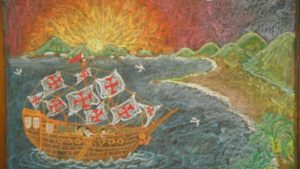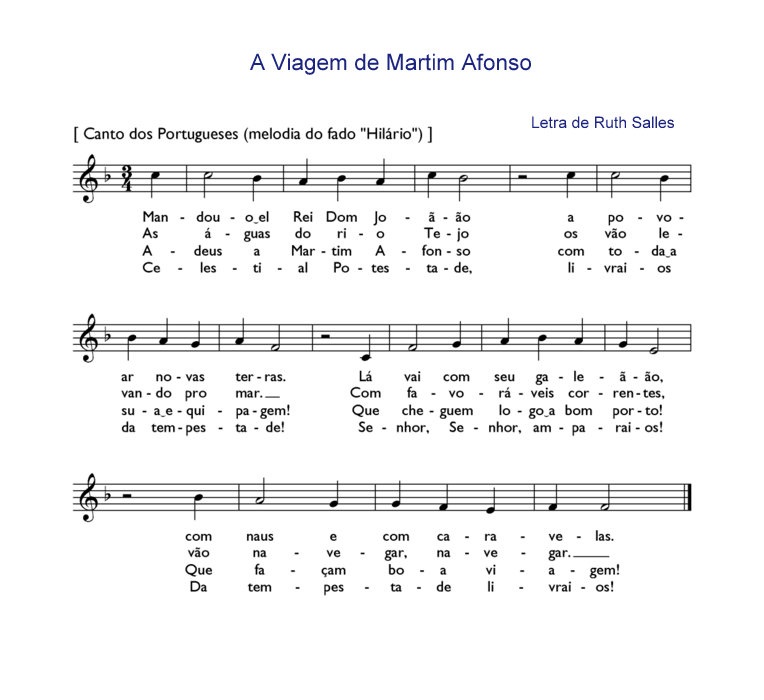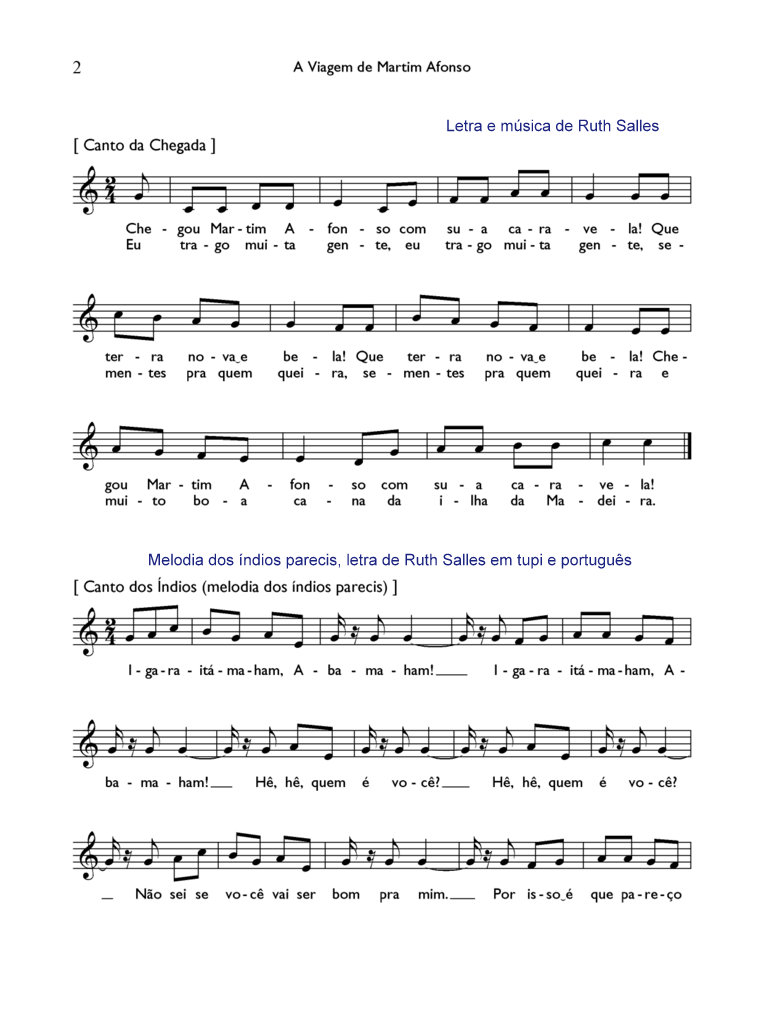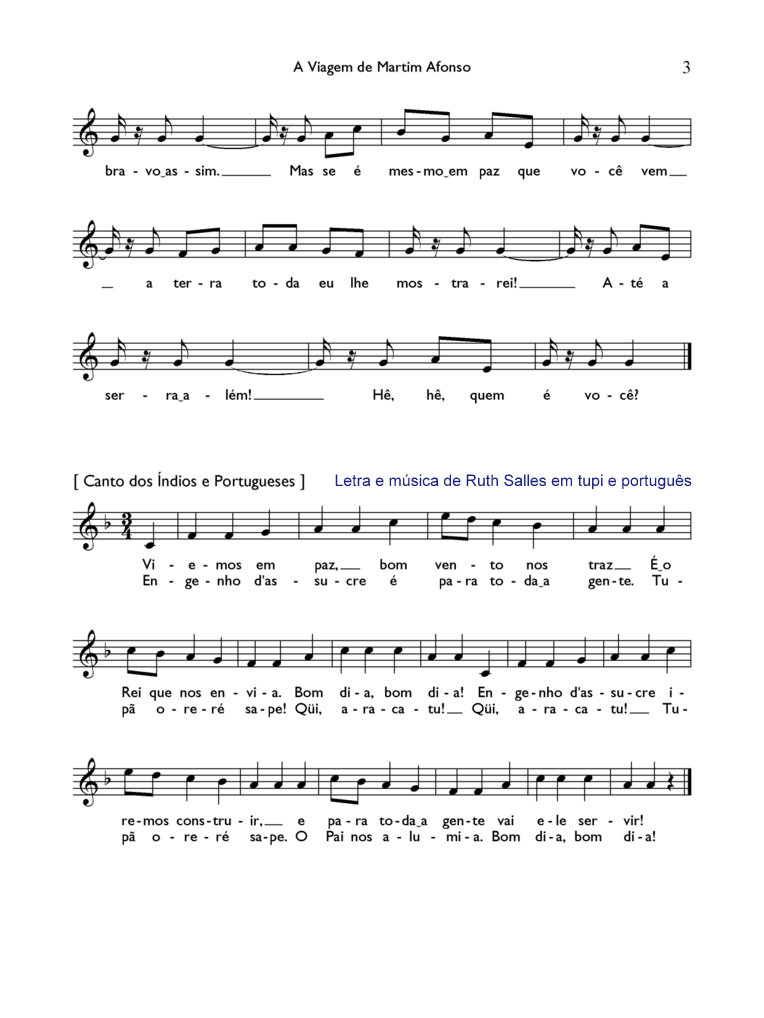[print-me target="body"]
play by Ruth Salles
Video with the author!

Blackboard drawing by teacher Ana Beatriz Ghirello, from Escola Waldorf Manacá, São Paulo SP
This piece is very moving. The children represent Martim Afonso's journey, the storm in the middle of the journey and the encounter with the Indians on arrival in São Vicente. The narrators¹ tell excerpts from manuscripts from 1590, probably authored by the Jesuit Francisco Soares²; at the sailors' departure, the Portuguese who stayed say goodbye singing my lyrics to the old and well-known Fado “Hilário”; in the passage of the storm I inserted some verses of “Lusíadas” by Camões³; these spoken excerpts that are not my own are enclosed in quotation marks in the play. Upon arrival in São Vicente, I inserted a song by the Parecis Indians with my lyrics in Tupi and Portuguese.
The capstan, the sails, the crow's nest are imaginary, but the movements are made as if everything were there. Only, in the middle of the trip, a little chair appears where the guy climbs up to look through the (imaginary) telescope and shout “Land in sight!”
T-shirt colors are symbolic.
Students can learn many new things in this play. For example, that Martim Afonso traveled with three different types of boats: the galleon, the ships and the caravels; that navigators and sailors (equipment) set out across the Tagus River to the sea, and that they depended on favorable currents.
They learn about working with the anchor, the capstan, the foresails of the sails. They learn what port, starboard and bow are; what is windward, what the sailor and helmsman deal with, what is to lower (lower) the sail.
As for the words in Tupi: igara = boat; igaraitá = boats; maham = some; aba = man ("Some boats, some men"); the H is aspirated, the M is pronounced.
CHARACTERS:
presenters – white t-shirt or tunic (the divine blessing)
narrators – blue t-shirt (the mysterious fate of peoples)
Jesuit – black tunic; a tall cross in his right hand (he is silent among the narrators)
Portuguese – yellow or orange shirt (those residing in the country where the king is; the royal power)
King Dom João III – knitted tights, shirt and puffy shorts, sneakers, crown, neck ribbon with the cross of the Order of Christ, roll of paper in hand (the king is among the Portuguese)
Sailors and Sailors – red t-shirt (force of action)
Martim Afonso – knitted tights, shirt and puffy shorts, sneakers, beret, neck ribbon with the cross of the Order of Christ (Martim Afonso is among the navigators)
indians – brown shirt (children of the earth), a headband with a feather; barefoot, bows in hand, one with a drum to play when it's time.
Narrators can be in the background of the scene.
Presenters can stand to the left. The Jesuit is silent in the center and in front of the narrators. The Portuguese with the king are on the right. The navigators and sailors can form two ranks, like a V that opens from the narrators. The play begins with the navigators and sailors on their knees. The Jesuit blesses them.
PRESENTERS (while the Jesuit blesses sailors and sailors):
- Blessed are these brave ones
that will leave for the immense sea,
that go in search of continents
with other lands to live in.
The great riddle in front of you
it is the future to unfold.
be praised by everyone
and in good time they can return.
NARRATORS (slowly and solemnly; navigators and sailors rise):
– “While there is to be news and information about something,
Brazil was populated by Martim Afonso de Souza. “ (from the 16th century chronicle)
(The king hands Martim Afonso the scroll that gives him authority.)
MARTIM AFONSO (at the head of sailors and sailors, as captain-major):
- I will, by order of the king,
populate and cultivate
the new and wild land.
Defend from all evil,
take care of her very well
are missions of this trip. (joins sailors and sailors)
MASTER (orders aloud, cupping his hands beside his mouth):
– Lift anchor…! (movement of the sailors pulling the anchor)
To the capstan…! (movement of the sailors turning the capstan)
PORTUGUESE (singing; sailors and sailors sway to the rhythm):
“The King Dom João sent him
to populate new lands.
There he goes with his galleon,
with ships and with caravels.
The waters of the Tagus River
will take them out to sea.
With favorable currents
will navigate, navigate.
– Farewell to Martim Afonso (they wave colorful handkerchiefs)
with all your crew!
May they arrive soon in good port!
Have a good trip!”
SAILORS (swinging to the rhythm and pointing out those mentioned):
– Gajeiro in the crow’s nest,
helmsman at the helm.
The master, the foreman
and sir captain.
MASTER (speaking loudly as before):
– Drop the mainsails…! (sailors movement)
SAILORS (swaying to the beat):
- I go in the waters, I go in time,
sailing to windward.
I go in the waters, I go in time,
sailing to windward.
SAILOR 1 (screams, looking to the left of the boat):
– Sharks on the port side!
SAILOR 2 (screams, looking to the right of the boat):
– I see a fish flying on the starboard side!
SAILOR 3 (screams as he looks out the front of the boat):
– Dolphins by the bow!
SAILORS (astonished, seeing the master look at the sky, worried [Camões]):
– Here is the master who, looking at the air, walks…
The foresails of the sails take command…
(move)
CONTRAMESTRE (high [still Camões]):
– A cloud that darkens the air
over our heads appears!
Alert, that the wind grows…!
SAILORS (moving around, scared [still Camões]):
– Great and sudden storm!…
MASTER (tall [still Camões]):
– Amaina! Amaina the big candle…!
(sailors movement)
CONTRAMESTRE (high [still Camões]):
– Grain sum of water by the bordoooo…!
MASTER (tall [still Camões]):
– Alijaa…! Throw it all overboard! (Sailors draw water from inside with imaginary buckets)
– Others will give the bombaaaa…!
By the pump, we're going to flood…!” (the sailors begin to draw water by pumping it into an imaginary pump)
PORTUGUESE (in their land, they think of sailors and pray singing):
“Heavenly Power,
deliver them from the storm!
Lord, Lord, help them!
From the storm deliver them!” (Meanwhile, sailors and sailors sway strongly, then slow down.)
PRESENTERS ([Camões]):
– “After a stormy storm,
nocturnal shadow and hissing wind,
brings the morning serene light,
hope of harbor and rescue.”
BOWMAN (aloud, to the gajeiro who is standing on a stool)
– Dude!!!
GAJEIRO:
– Yes, sir?
FOREMAN:
- Alert!
GAJEIRO (looking through the imaginary spyglass):
– Land in sight!!!
CONTRAMESTRE (addressing Martim Afonso):
– Good luck, lord captain-major! Land in sight!
ALL (excited, throwing caps in the air):
– Land in sight…!!!
SAILORS AND SAILORS (singing happily):
“Martim Afonso arrived
with your caravel!
What a new and beautiful land!
What a new and beautiful land!
Martim Afonso has arrived
with your caravel!”
NAVIGANTS AND SAILORS (they speak backwards, in the rhythm of the drum of the Indians, who advance):
– But behold, on the beaches,
in the woods, in the rivers,
covered in feathers,
Indians spy...
With bows and arrows,
come dumb with amazement.
They distrust us,
don't know who we are...
SAILORS AND SAILORS (singing to the previous melody):
“I bring a lot of people,
I bring a lot of people,
seeds for anyone who wants
seeds for those who want
and very good cane
from the island of Madeira.”
NARRATORS (speaking):
– “Is this wilderness
populated by different peoples.
These do not steal, they are loyal,
they have neither gossip nor hatred,
are not greedy
and give what they have easily.
Have news of the flood
and they say that the whole world was flooded.
Only one brother and one sister remained.
They know that man has a soul,
and then their souls go
to some very beautiful fields.”
INDIANS (sing):
“Igaraitamahan, Abamaham! Igaraitamaham,
Abamahan!
Hey, hey, who are you? Hey, hey, who are you?
I don't know if you'll be good for me.
That's why I look angry like this.
But if it is really in peace that you come,
the whole earth I will show you!
To the mountains beyond! Hey, hey, who are you?”
SAILORS AND SAILORS (sing):
“We come in peace,
good wind brings us.
It is the king who sends us.
Good morning Good Morning!
sugar mill
we will build,
and for everyone
he will serve!”
INDIANS (sing the same melody):
“Engenho d'assucre
it's for everyone.
Tupa oreré sape! (God enlightens us)
Thu, aracatu!” (Oh good morning)
INDIANS, NAVIGATORS AND SAILORS
(singing happily):
“Hey, aracatu!
Tupa oreré sape.
The Father enlightens us.
Good morning Good Morning!"
(Navigators and sailors, mixed with the Indians, kneel down, seeing that the Jesuit, until then immobile, takes a few steps forward and implants the cross in the earth.)
NARRATORS (solemnly [from the chronicle]):
– “In a very beautiful bay,
in seven degrees from the southern band,
it is,
on the island of Guaípe,
Saint Vincent,
waiting to give news and information”.



*1: ROQUETE-PINTO, Edgard. Rondônia: Anthropology-Ethnography. Rio de Janeiro: Editora FIOCRUZ, 2005.
*2: SOARES, Father Francisco. Of Some Most Remarkable Things in Brazil: manuscripts from Coimbra and Madrid from 1591-6. National Book Institute, 1966.
*3: CAMÕES, Luís de. The Lusiads. São Paulo: Edições Melhoramentos, 13th edition, date n/d.
***


